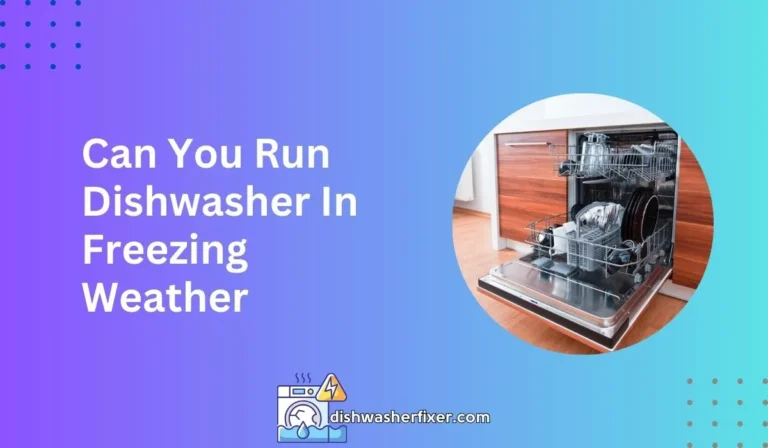Why is Dishwasher Making Grinding Noise? 5 Surprising Reasons!
A dishwasher making a grinding noise usually indicates a hard object, like a bone or seed, is caught in the chopper blade or pump assembly. It could also signal a worn-out bearing or motor issue. Check for debris and inspect the blade and motor for damage.
Common Causes of Grinding Noises in Dishwashers

Food Particles and Debris
One of the most frequent culprits behind a noisy dishwasher is the presence of food particles and debris.
These remnants can easily become lodged in the dishwasher’s filter or pump, creating a grinding sound as the machine operates.
Over time, the accumulation of food waste can obstruct the normal operation of the dishwasher, leading to inefficiency and potential damage.
Foreign Objects in the Dishwasher
It’s not uncommon for hard objects, like bones from fish or chicken, or fruit pits to end up in the dishwasher.
When these items get caught in the chopper blade or pump assembly, they can cause a persistent grinding noise. It’s important to prevent these items from entering the dishwasher to maintain its longevity.
Deterioration of the Dishwasher Motor
A dishwasher’s motor is integral to its operation. Over time, wear and tear can lead to the motor deteriorating, which may manifest as a grinding sound during a wash cycle. This deterioration may be due to age, frequent use, or manufacturer defects.
Wash Arm Assembly Issues
The wash arm assembly plays a vital role in distributing water during a cycle. If there are issues with this component, such as obstructions or damaged bearings, it can result in grinding noises. Regular maintenance can help prevent these issues.
Drain Impeller Problems
The drain impeller is responsible for pushing water out of the dishwasher. If it becomes damaged or encounters problems, it could be the source of a grinding noise. Checking the impeller for damage and ensuring it’s functioning properly is crucial.
Troubleshooting and Diagnosing Grinding Noises

Cleaning the Filter and Sump Area
Regular cleaning of the dishwasher filter and sump area is essential for preventing grinding noises. Over time, these areas can collect food particles and debris that contribute to noise and impede performance. A thorough cleaning can often resolve minor noise issues.
Chopper Blade Area Inspection
Inspecting the chopper blade area for obstructions is a key step in diagnosing dishwasher noises. If hard objects have become lodged here, they must be carefully removed to prevent further damage and restore quiet operation.
Wash Arm Assembly Check
Examining the wash arm assembly for any obstructions or signs of damage can help identify the source of grinding noises. It’s important to ensure that the wash arms are free to rotate and that their bearings are in good condition.
Listening for Noise Variations
Attentively listening to the dishwasher during a cycle can provide clues to the source of the grinding noise. Variations in the sound can indicate whether the issue lies with the motor, the pump, or another component.
Running an Empty Cycle
Running a dishwasher cycle without any dishes can help determine if the grinding noise is related to the dishes themselves or the dishwasher. If the noise persists, the problem likely lies within the dishwasher’s mechanisms.
Professional Repair vs. DIY Solutions

When to Call a Professional
If you’re experiencing signs of motor failure or complex mechanical issues, it’s time to call a professional. These problems often require specialized knowledge and tools to fix properly.
DIY Fixes to Attempt
For those who are handy, certain DIY fixes such as cleaning filters and checking for obstructions are safe to attempt. These simple solutions can often resolve the issue without the need for professional intervention.
Risks of DIY Repairs
Attempting DIY repairs comes with risks, including the potential to worsen the problem or void any existing warranties. It’s important to weigh these risks before proceeding with DIY fixes.
Cost Considerations for Professional Services
While professional repair services can be costly, they often provide value through expert diagnostics and reliable repairs. It’s important to consider the cost against the benefits of having a properly functioning dishwasher.
FAQs About Dishwasher Making Grinding Noise
Why is my dishwasher suddenly making a grinding noise?
A grinding noise in your dishwasher could indicate that a hard object like a bone or seed is trapped in the chopper blade or pump assembly.
Can a grinding noise in my dishwasher be due to a motor issue?
Yes, a grinding noise may signal a worn-out bearing or motor issue in your dishwasher.
What should I do if my dishwasher makes a grinding noise?
First, check for and remove any debris in the dishwasher. Then inspect the chopper blade and motor for signs of damage or wear.
Is it safe to continue using my dishwasher if it’s making a grinding noise?
Continuing to use your dishwasher with a grinding noise can cause further damage. It’s best to inspect and address the issue immediately.
Could a grinding noise indicate a problem with the dishwasher’s pump assembly?
Yes, a grinding noise could mean that something is caught in the dishwasher’s pump assembly or that the assembly itself is damaged.
Final Thoughts
A dishwasher emitting a grinding noise typically suggests the presence of a hard item obstructing the chopper blade or pump assembly, such as a bone or a seed.
Additionally, this sound may indicate a more serious issue like a failing bearing or a motor problem. It’s advisable to search for and remove any debris and evaluate the condition of the blade and motor for potential damage.




